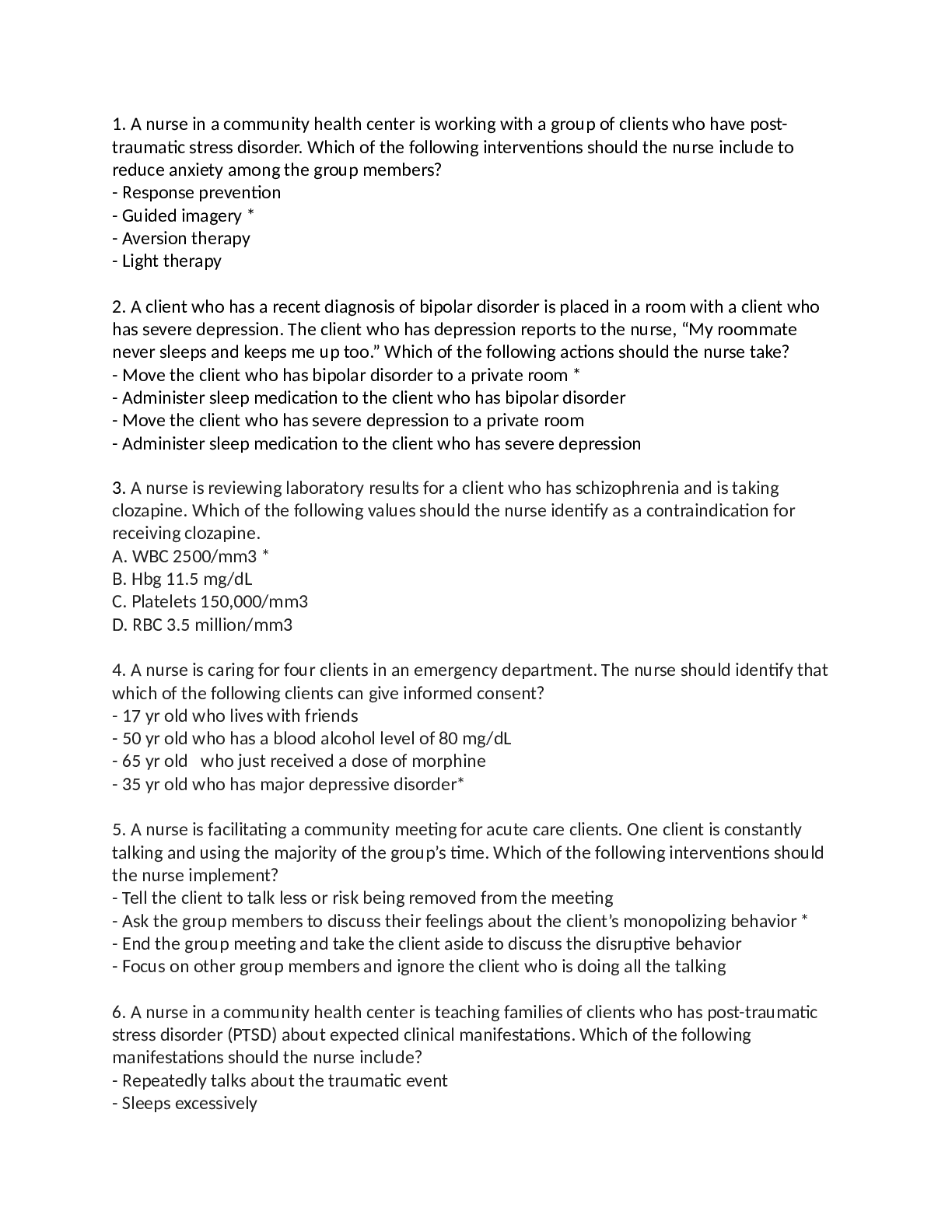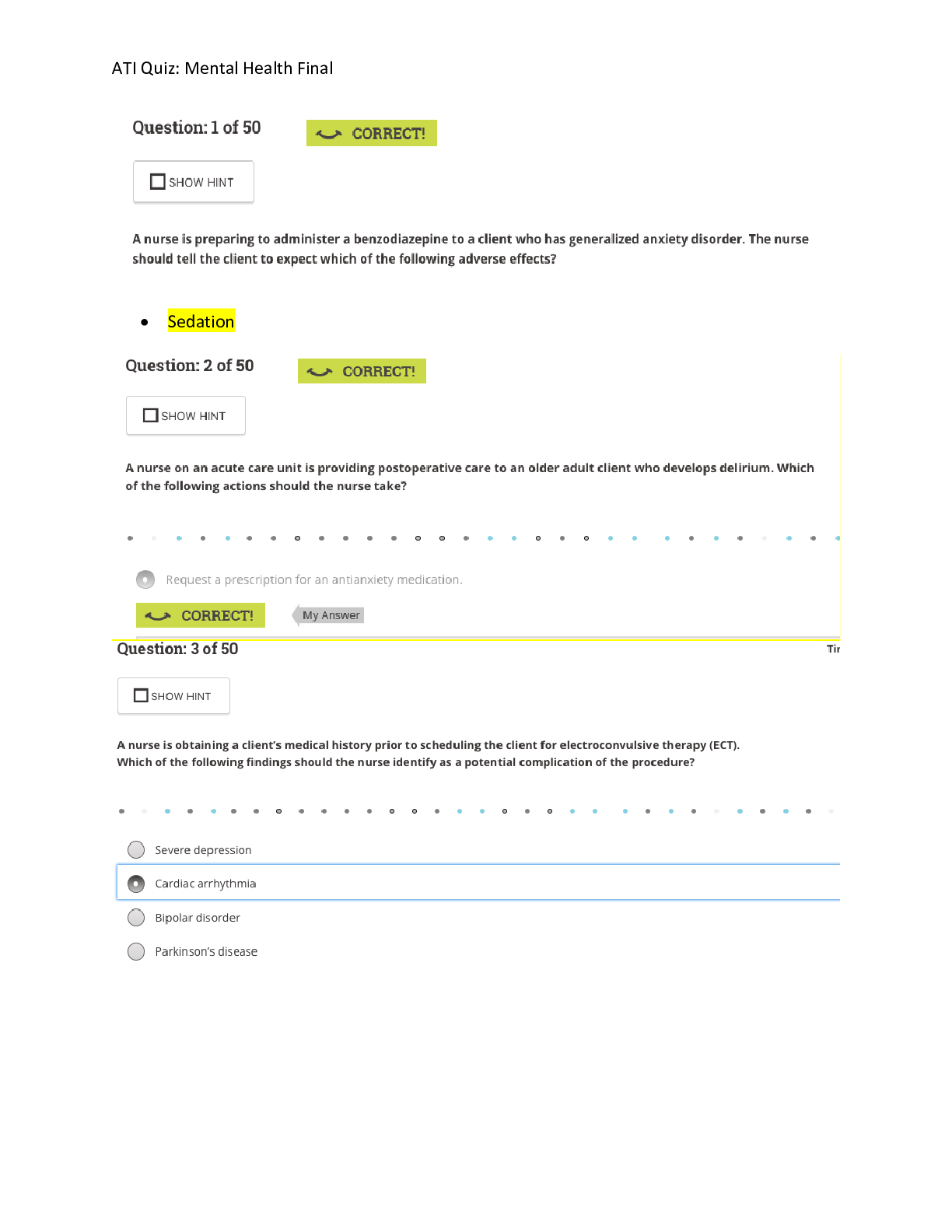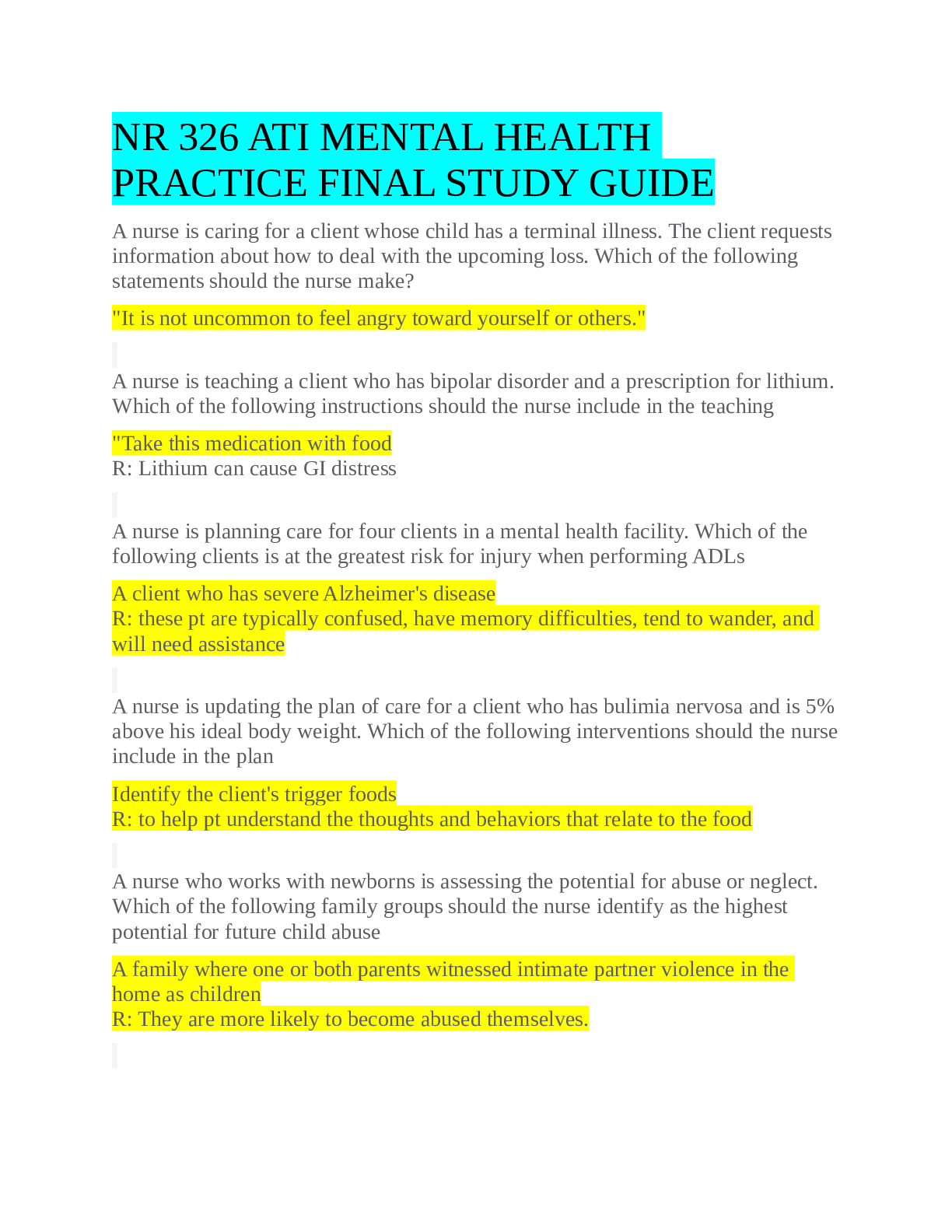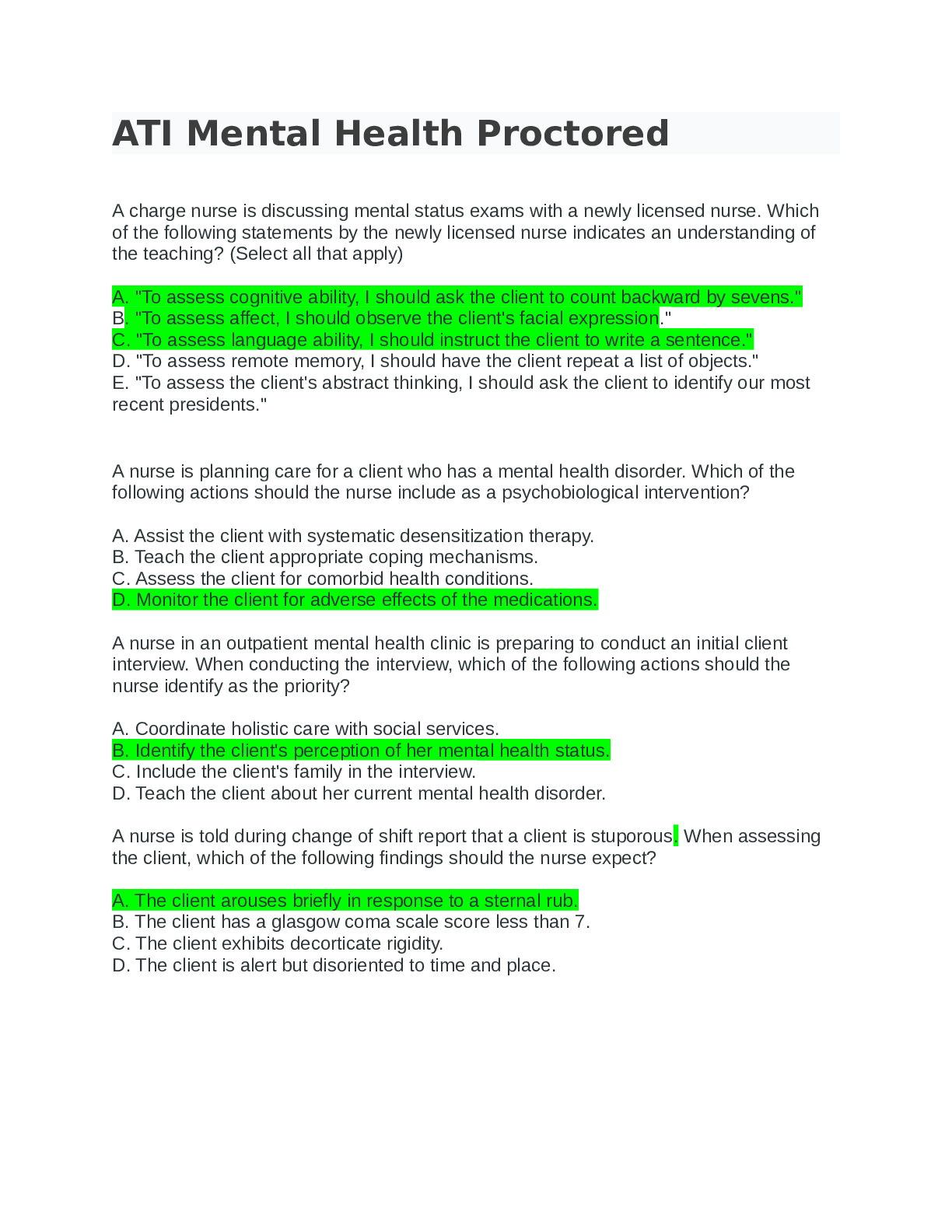*NURSING > EXAM > NURSING 4764 ATI Mental Health 2016 A Practice Questions And Answers/SCORE A+ (All)
NURSING 4764 ATI Mental Health 2016 A Practice Questions And Answers/SCORE A+
Document Content and Description Below
ATI MENTAL HEALTH 2016 PRACTICE A 1) A nurse is assessing a pt who has bulimia nervosa. The nurse should expect which of the following findings? Amenorrhea A client who has anorexia nervosa is more li... kely to have amenorrhea resulting from low body weight. Lanugo A client who has anorexia nervosa is more likely to have lanugo resulting from extreme malnutrition. Cold extremities A client who has anorexia nervosa is more likely to have cold extremities from extreme malnutrition. Tooth erosion A client who has bulimia nervosa is likely to have dental carries and tooth erosion caused by frequent exposure to gastric acid from vomiting. 2) A nurse in a mental health unit observes a pt who has acute mania hit another pt. Which of the following actions should the nurse take first? Call the provider to obtain an immediate prescription for restraint. Calling the provider for an immediate prescription for restraint is an appropriate action. However, this is not the first action the nurse should take. Prepare to administer benzodiazepine IM. An IM injection of a benzodiazepine might be indicated for this client. However, this is not the first action the nurse should take. Call for a team of staff members to help with the situation. The greatest risk is injury to the client and others. Therefore, the first action the nurse should take is to call for assistance to prevent further injury to himself or others. Check the client who has was hit for injuries. Once the nurse and other clients are safe, the nurse should assess the client who was hit for injuries to determine if medical intervention is needed. However, this is not the first action the nurse should take. 3) A nurse is performing a cognitive assessment to distinguish delirium from dementia in a pt whose family reports episodes of confusion. Which of the following assessment findings supports the nurse’s suspicion of delirium? Slow onset Delirium has an acute onset. Dementia is a slow, progressive decline. Aphasia Aphasia is a manifestation of dementia. Confabulation Confabulation is a manifestation of dementia. Easily distracted Extreme distractibility is a hallmark manifestation of delirium. 4) A nurse is caring for a pt who has anorexia nervosia. Which of the following criteria requires hospitalization? Weight loss 10% of total body weight in 3 months Criteria for hospitalization is weight loss over 30% of total body weight in 6 months. Potassium 3.8 mEq/L A potassium level of 3.8 mEq/L is within the expected reference range. A potassium level less than 3 mEq/L is criteria for hospitalization. Temperature 35.6° C (96.1° F) Severe hypothermia, a temperature lower than 36° C (96.8° F) due to loss of subcutaneous tissue or dehydration, requires hospitalization. Heart rate 54/min Criteria for hospitalization is a heart rate less than 40/min. 5) A nurse in a mental health clinic is caring for a pt who has bipolar disorder and reports that she stopped taking Lithium 2 weeks ago. The nurse should recognize which of the following as an expected adverse effect that might have caused the pt to stop taking the med? Sore throat A sore throat is not an expected adverse effect of lithium. Photophobia Photophobia is not an expected adverse effect of lithium. Hand tremors Fine hand tremors are an expected adverse effect of lithium and can interfere with the client's ADLs, causing the client to stop taking the medication. Constipation Diarrhea is an early manifestation of lithium toxicity. 6) A nurse in an ER is caring for a female adolescent who has a diagnosis of bulimia nervosa and had a fainting episode during a ballet performance. Which of the following statements by the mother acknowledges her daughter’s diagnosis? "She works so hard at ballet. Will she still be able to perform?" This statement provides little insight into the client's current psychological condition and indicates that the mother might be in denial. "She won't let me take the trash from her room. I'm concerned about what she has in there." The client might be binge eating and attempting to hide her food containers, which is a common behavior among clients who have bulimia nervosa. The mother's statement indicates awareness of her daughter's behavior. "She told me she was tired, so I did her chores for her today." This statement by the mother indicates that she is responding to her daughter's eating disorder with enabling behavior. "She is happier with her appearance now that she's lost some weight." This statement suggests that the mother is identifying positive effects of the eating disorder rather than understanding the negative health effects it has on her daughter. 7) A nurse is caring for a pt who has antisocial personality disorder and is receiving behavioral therapy through operant conditioning. Which of the following pt behaviors indicates effectiveness of the therapy? Controls anger outbursts to avoid being placed in seclusion Changing behavior to avoid punishment is not an optimal goal of operant conditioning therapy. No longer exhibits a fear of social or public situations There is no evidence that this client has a social phobia. Phobias are usually treated with desensitization therapy. Refrains from manipulating others to earn dining-room privileges The goal of operant conditioning is to provide positive reinforcement in return for a desired behavior. Refraining from manipulative behavior is a desired response. Imitates the therapist's use of a relaxation technique Imitating behavior is modeling and does not demonstrate the desired outcome of operant conditioning. 8) A nurse is admitting a pt who has anorexia nervosa and is at 60% of ideal body weight. Which of the following interventions should the nurse include in the plan of care? Encourage the client to drink 125 mL of fluid each hour while awake. The nurse should encourage the client to drink 125 mL of fluid each waking hour to maintain hydration. Allow the client to eat independently in his room. The nurse should remain with the client during the duration of meals to prevent the client from purging or hiding his food in clothing. Weigh the client twice weekly. For the first week of treatment, the nurse should weigh the client daily upon waking, after voiding, and before having anything to drink or eat. Thereafter, the nurse should weigh the client three times per week. Measure the client's vital signs once each day. Initially, the nurse should measure the client's vital signs three times each day until the client's weight increases and cardiovascular status improves. 9) A nurse is assessing a pt who has major depressive disorder and has been receiving amitriptyline for 1 week. Which of the following outcomes should the nurse expect? Rapid improvement in affect within 30 to 60 min after taking the medication Initial therapeutic response to amitriptyline can take 1 to 3 weeks to develop. It may take 1 to 2 months for optimal response to be achieved. Greater risk of attempting suicide as affect and energy improve An initial response to amitriptyline can develop in 1 week. For a client who has been severely depressed with suicidal ideation, the energy to carry out a plan is more possible after 1 week of treatment. Onset of frequent loose stools Constipation and possible paralytic ileus are adverse effects of amitriptyline. Development of physiologic dependence on the medication Physiologic dependence does not occur with amitriptyline 10) A nurse is admitting a pt who has major depressive disorder and a new prescription for tranylcypromine. Which of the following OTC meds that the pt reports taking should alert the nurse to a potential adverse reaction? Lansoprazole Lansoprazole does not interact adversely with tranylcypromine. Naproxen Naproxen does not interact adversely with tranylcypromine. Magnesium hydroxide Magnesium hydroxide does not interact adversely with tranylcypromine. Phenylephrine Clients who are taking tranylcypromine, an MAOI antidepressant, should not take phenylephrine and other over-the-counter medications for sinus congestion, colds, or allergies due to their actions on the sympathetic nervous system, which can result in 11) A nurse is caring for a pt who has recent diagnosis of Alzheimer’s disease. The pt’s partner asks the nurse about expected manifestations. The nurse should teach the partner to expect which of the following manifestations to occur first? Inability to recognize family members The inability to recognize family members manifests as Alzheimer's disease progresses. However, evidence-based practice indicates that another manifestation is expected to occur first. Chooses clothing that is inappropriate for the weather Difficulty choosing clothing that is appropriate for the weather manifests as Alzheimer's disease progresses. However, evidence-based practice indicates that another manifestation is expected to occur first. Exhibits a change in personality A change in personality manifests as Alzheimer's disease progresses. However, evidence-based practice indicates that another manifestation is expected to occur first. Frequently misplaces objects According to evidence-based practice, the nurse should identify that mild cognitive impairment, such as frequently misplacing objects, is one of the first manifestations expected to occur for a client who has Alzheimer's disease. As the disease progresses, other manifestations of moderate and severe cognitive impairment will occur. 12) A nurse on a medsurg unit is assessing a pt who sustained injuries 12 hrs ago following a motor vehicle crash. The pt’s blood alcohol level was 325mg/dL. Which of the following findings should indicate to the nurse that the pt is experiencing alcohol withdrawl? Somnolence Alcohol withdrawal is an acute condition that occurs following a sudden cessation of alcohol intake. It can occur in a client who has a long history of alcohol use or after a bout of heavy alcohol intake. Manifestations include agitation, insomnia, and irritability. Blood pressure 154/96 mm Hg Physical manifestations of alcohol withdrawal occur in addition to psychological effects. A client who is experiencing alcohol withdrawal is expected to have hypertension, tachycardia, and fever greater than 38.3° C (101° F). It will be important for the nurse to rule out infection in the client who has a fever. Pinpoint pupils A client who is experiencing alcohol withdrawal can experience profuse sweating and dilated pupils as a part of the autonomic nervous system's response. The autonomic nervous system is responsible for management of homeostasis. It has sympathetic and parasympathetic effects impacting the pupils of the eyes as well as the circulatory, respiratory, gastrointestinal, genitourinary, and integumentary systems. Blood glucose 210 mg/dL Medical complications occur as a result of alcohol withdrawal, including hypoglycemia. As the glycogen stores in the liver are depleted from extensive alcohol intake, the body's ability to produce glucose is impaired. As a result, blood glucose levels fall, often requiring parenteral dextrose to be administered. Associated manifestations of hypoglycemia are also seen in clients experiencing alcohol withdrawal, such as shakiness and diaphoresis. The nurse should monitor blood glucose levels and encourage carbohydrate intake. 13) A nurse in a mental health facility is caring for a pt who has schizophrenia. Which of the following places the pt at the greatest risk for self directed injury or injuring others? Inability to communicate with others A client who has schizophrenia can have an impaired ability to communicate with others. However, this does not place the client at greatest risk for self-directed injury or injuring others. Feelings of absence of self-worth A client who has schizophrenia can experience feeling an absence of self-worth. However, this does not place the client at greatest risk for self-directed injury or injuring others. Lack of motivation to perform daily tasks A client who has schizophrenia can experience a lack of motivation to perform daily tasks. However, it does not place the client at greatest risk for self-directed injury or injuring others. Command hallucinations A client who has schizophrenia and is experiencing command hallucinations can hear voices telling him to hurt himself or others. Therefore, a client who is experiencing command hallucinations is at the greatest risk for self-directed injury or injuring others. 14) A nurse is caring for a pt who has attempted suicide and has alcohol use disorder. Which of the following statements indicates that the pt is using a positive coping mechanism? "I will limit my drinking to the weekends." A client who has alcohol use disorder should not drink at all. "I will stay in my room and avoid others when I'm feeling down." Isolation increases the risk for self-harm. The nurse should encourage the client to seek out a support person when feeling down. "I will be dependent on others for the time being." Dependency is not a positive coping mechanism because the client needs to practice self-care. "I will attend daily group therapy sessions to practice relaxation techniques." Relaxation techniques decrease the risk for self-harm by decreasing stress, anxiety, and depression. 15) A nurse is assessing a family’s dynamics during a counseling session. The nurse should recognize which of the following findings as an indication of a boundary issue? An adolescent family member who questions parental authority An adolescent who questions parental authority is demonstrating appropriate behavior for developmental age. A family with three generations in the same household This scenario occurs in many households, and it is not an indication of a boundary issue. Older children who are responsible for their younger siblings This is an example of enmeshed boundaries in which there are no distinctions between the roles of family members. Two adults and their children from prior relationships in the same household This is an example of a blended family, and it is not an indication of a boundary issue. 16) A nurse is providing teaching to a pt who is to begin undergoing light therapy at home to treat seasonal affective disorder. Which of the following should the nurse include in the teaching? Have a family member present during treatment. This precaution is not necessary with light therapy. Increase fluid intake. Light therapy does not increase the risk of dehydration. Change position slowly. Light therapy is unlikely to cause orthostatic hypotension or dizziness. Wear sunglasses when outdoors. Light therapy, or phototherapy, can cause eye strain and sensitivity to light. 17) A nurse is caring for a pt who has schizophrenia and was prescribed a conventional antipsychotic med yesterday. Which of the following findings indicates the nurse should administer Benztropine 2mg IM? Shuffling gait Benztropine is used to treat parkinsonism manifestations, such as shuffling gait. Hypotension Orthostatic hypotension is an adverse effect of conventional antipsychotic medications. However, it is not treated with benztropine. Decreased WBC count Agranulocytosis is an adverse effect of conventional antipsychotic medications. However, it is not treated with benztropine. Blurred vision Blurred vision is an adverse anticholinergic effect of conventional antipsychotic medications. However, it is not treated with benztropine. 18) A nurse is caring for a child who has conduct disorder and is behaving in a destructive manner, throwing objects and kicking others. Which of the following therapeutic nursing interventions is the priority? Encourage expression of feelings. The nurse should encourage the child to express feelings in order to acknowledge them. However, another action is the priority. Promote attendance at an assertiveness training group. The nurse should promote attendance at an assertiveness training group. However, another action is the priority. Assist the client to perform relaxation breathing. The nurse should assist the client to perform relaxation breathing. However, another action is the priority. Reduce environmental stimuli. The greatest risk to the child and others is harm. Therefore, the nurse's priority intervention is to reduce environmental stimuli in an attempt to de-escalate the behavior and prevent injury. 19) A nurse is preparing to administer chlorpromazine 0.55 mg/kg PO to an adolescent who weighs 110 lb. Available is chlorpromazine syrup 10 mg/5 mL. How many mL should the nurse administer? (Round the answer to the nearest whole number) 14 mL 110 lb x (1 kg/2.2 lb) = 50 kg 50 kg x 0.55 mg = 27.5 mg 27.5 mg x(5 mL/10 mg) = 14 mL 20) A nurse in an outpatient mental health setting is collecting a health history from a client who is taking paroxetine for depression. The client reports to the nurse that he also takes herbal supplements. The nurse should advise the client that which of the following supplements interacts adversely with paroxetine? St. John's wort St. John's wort is an herbal preparation that decreases the reuptake of serotonin. The nurse should advise the client that taking St. John's wort with another medication that also inhibits the reuptake of serotonin, such as paroxetine, places the client at risk for serotonin syndrome. Saw palmetto Saw palmetto is used to treat benign prostatic hyperplasia. It does not interact adversely with paroxetine. Echinacea Echinacea is used to enhance immune function. It does not interact adversely with paroxetine. Ginkgo Ginkgo is used to relieve pain from peripheral arterial disease. It does not interact adversely with paroxetine. 21) A client who has a diagnosis of depression is attending group therapy. During the group meeting, the nurse asks each member to identify one goal for the day. When it is the client's turn, she does not respond. Which of the following actions should the nurse take before repeating the request to the client? Allow the client time to collect her thoughts. Slowed response time is common in clients who have depression. The nurse should allow the client time to comprehend and formulate an answer to the question. Prompt the client to give a response. A client who has depression might have a slow response rate. Prompting can place pressure on the client. Move on to the next client. Skipping the client might minimize the client's involvement in the group process and cause her additional difficulty when answering the question. Offer the client a suggestion for a goal. A client who has depression is able to make decisions for herself. Therefore, the nurse should not deny the client this ability to participate in her treatment. 22) A nurse is working with a group of parents who recently lost a child. Which of the following actions should the nurse take? Encourage the parents to avoid discussing the death with their other children in order to protect their feelings. Siblings also experience feelings of intense grief and need to know it is acceptable for the family to grieve together. Recommend each parent grieve in private to avoid hindering each other's healing. Although parents tend to grieve differently, it is important they share their grief and communicate their needs to decrease the likelihood of marital upset. Suggest forming a weekly support group for parents who have experienced the loss of a child. Support groups are a positive resource in the process of recovery for parents who have lost a child. Advise the parents to begin counseling if they are still grieving in a few months. The grief process varies for each individual. Setting an expected period for grief places the parents at risk for further problems if they feel they have not completed the grieving process on time. 23) A nurse is caring for a client who is experiencing alcohol withdrawal. Which of the following medications should the nurse administer first? Vital Signs Heat rate 110/min Blood pressure 170/96 mm Hg Temperature 38.9° C (102° F) History and Physical Client states he consumed alcohol 12 hr prior to admission. Client has a 2 pack/day smoking history. Progress Notes Tremors of hands and fingers bilaterally Emesis of 30 mL bile-colored fluid Client is restless and unable to sit still. Client is diaphoretic and has flushed skin. Diazepam 5 mg IV bolus The greatest risk to the client who is experiencing alcohol withdrawal is seizures, an elevated heart rate, and elevated blood pressure. IV diazepam acts rapidly to prevent seizures, stabilize vital signs, and decrease the intensity of withdrawal manifestations. Clonidine 0.1 mg transdermal patch Clonidine can stabilize vital signs and is used as an adjunct to a benzodiazepine. It is administered PO or transdermal for treatment of hypertension and does not act rapidly. Therefore, it is not the first medication the nurse should administer. Naltrexone 380 mg IM Naltrexone can be given to assist with long-term abstinence maintenance. However, it is not the first medication the nurse should administer. Bupropion 150 mg PO Bupropion can be given for smoking cessation. However, it is not the first medication the nurse should administer. 24) A nurse is planning care for an adolescent who is being admitted to an acute care unit following a suicide attempt. Which of the following interventions should the nurse identify as the priority? Arrange one-to-one observation of the client. The greatest risk to the client is self-injury. Therefore, the priority nursing intervention is one-to-one observation to promote client safety. Encourage interaction with the client's peers. Encouraging the client to interact with peers is important to facilitate socialization. However, another intervention is the priority. Administer medication for depressive disorder. Administering medication for depressive disorder is important to increase the client's mood over time. However, another intervention is the priority. Encourage the client to attend a support group. Encouraging the client to attend a support group is important. However, another intervention is the priority. 25) A nurse is preparing to discharge an older adult who attempted suicide to his home where he lives alone and has difficulty performing ADLs. Which of the following referrals should the nurse initiate? (Select all that apply." Occupational therapy is correct. An occupational therapist can assist the client to perform ADLs. Meal delivery services is correct. Meal delivery services are necessary due to the client's difficulty performing ADLs. Speech therapy is incorrect. There is no indication that the client needs a referral for speech therapy. Physical therapy is correct. A physical therapist can assess the client's mobility needs and assist with ADLs. Home health services is correct. Home health services provide a nursing assessment of the client's physical and mental status, as well as assistance with ADLs. 26) A nurse is caring for a client in a mental health facility. The nurse overhears another staff member make derogatory comments to the client. Which of the following actions should the nurse take? Confront the staff member. It is not the responsibility of the nurse to discipline other staff members. Encourage the client to report the incident. This action takes the responsibility away from the nurse who has overheard the comments. Document the incident in the client's health record. The incident should not be documented in the client's health record. Report the occurrence to the charge nurse. It is the charge nurse and the nurse manager's responsibility to confront the staff member about her behavior toward the client. 27) A client who has a recent diagnosis of bipolar disorder is placed in a room with a client who has severe depression. The client who has depression reports to the nurse, "That man in my room never sleeps and he keeps me up too." Which of the following is an appropriate action for the nurse to take? Move the client who has bipolar disorder to a private room. Clients who have bipolar disorder can disrupt the therapeutic milieu for other clients. Therefore, the nurse should move this client to a private room. Administer sleep medication to the client who has bipolar disorder. Administering sleep medication to prevent this disruption is not an appropriate intervention. Move the client who has severe depression to a private room. Clients who have severe depression are often at risk for self-harm and feel isolated. Therefore, the nurse should not move this client to a private room. Administer sleep medication to the client who has severe depression. Administering sleep medication to protect this client from the disruption is not an appropriate intervention. 28) A nurse is creating a plan of care for a client who has been placed in seclusion after threatening to harm others on the unit. Which of the following interventions should the nurse include in the plan? Document the client's behavior every 8 hr. The nurse should document the client's behavior every 15 to 30 min while the client is in seclusion. Limit the client's fluid intake to 50 mL/hr. There is no indication to limit the client's fluid intake. Renew the prescription for the client every 4 hr. The nurse should assess the client's behavior frequently during seclusion and should renew the prescription for seclusion for an adult client every 4 hr, for a maximum of 24 hr. Toilet the client every 4 hr. The nurse should offer toileting to the client every 15 to 30 min. 29) A client who has bipolar disorder is to be discharged home with a prescription for lithium. Which of the following statements indicates that client teaching regarding the medication has been effective? "I should eat a regular diet with normal amounts of salt and fluids." This statement indicates that the client understands the teaching because normal levels of sodium and fluid need to be maintained to ensure adequate excretion of lithium. If sodium levels are low, the body compensates by decreasing lithium excretion, which can lead to toxicity. "I should discontinue the lithium when I begin to feel better." Bipolar disorder is a chronic illness and is not cured with medication. The client will need to take medication throughout his lifetime. "I need to be careful to avoid becoming addicted to the lithium." Lithium is necessary for lifelong treatment of bipolar disorder. It does not have a potential for abuse or addiction. "I can skip a dose of medication if my stomach is upset." It is important for the client to take the medication as prescribed in order to maintain a therapeutic drug level. 30) A nurse is caring for a client who gave birth to a stillborn baby. Which of the following statements should the nurse make? "You probably want to hold your baby." Although it is usually therapeutic for the client to hold the baby in this situation, this statement makes an assumption about the client's needs and desires. The nurse should ask the client if she wants to hold the baby. "I'll stay with you just in case you want to talk." This response indicates the nurse's interest in the client and a desire to understand the client's feelings. "I know how you must be feeling." This response minimizes the client's feelings and makes an assumption about those feelings. "It hurts now, but things will be better soon." This response minimizes the client's feelings and offers false reassurance. 31) A nurse is caring for a child who is taking methylphenidate. The nurse should monitor the child for which of the following findings as an adverse effect of methylphenidate? Weight gain Weight loss is an adverse effect of methylphenidate. Tinnitus Tinnitus is not an adverse effect of methylphenidate. Tachycardia The nurse should monitor the child for tachycardia, which is an adverse effect of methylphenidate. Increased salivation Dry mouth is an adverse effect of methylphenidate. 32) A nurse is teaching a family member and a client who has a new diagnosis of Alzheimer's disease and is to start taking donepezil. Which of the following statements should the nurse include in the teaching? "Take this medication in the evening at bedtime." The client should take this medication in the evening at bedtime for optimal effectiveness. "Expect this medication to reverse the effects of Alzheimer's disease." Donepezil slows the progression of the disease but does not reverse the pathological changes in the brain. "If you miss a dose, double the next dose." The client should not double the dose after a missed dose due to the adverse effects of the medication but should notify the provider. "You can crush this medication in applesauce." Crushing, chewing, or splitting the medication can affect the absorption of the medication. If the client has difficulty swallowing, the provider can prescribe orally disintegrating tablets 33) A nurse is teaching a newly licensed nurse about nursing care plans for clients who have depressive disorders. Which of the following statements by the newly licensed nurse indicates an understanding of the teaching? "I will use the same plan of care and interventions for each client who has depression." Each client should have an individualized plan of care that addresses the unique medical diagnosis, nursing care needs, and discharge plan. "Each individual nurse will develop a separate plan of care when managing clients who have depression." Each client should have one plan of care that is initiated upon admission and used by all interprofessional team members. "I will update the plan of care as a client's manifestations of depression change." The nurse should update the plan of care as a client's status and needs change. "An assistive personnel can use the plan of care for client teaching." An RN, not an assistive personnel, is qualified to provide client teaching. [Show More]
Last updated: 1 year ago
Preview 1 out of 13 pages
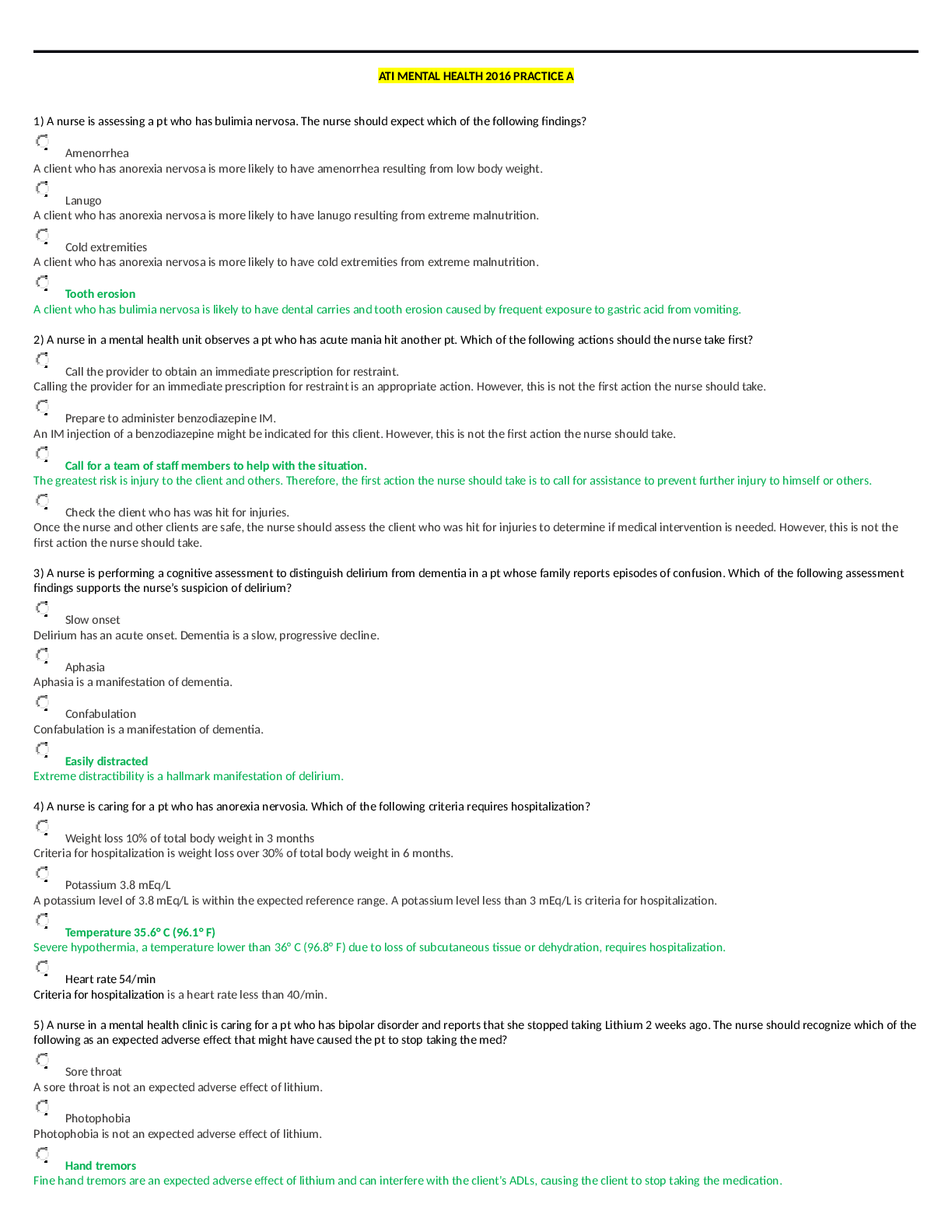
Buy this document to get the full access instantly
Instant Download Access after purchase
Add to cartInstant download
We Accept:

Reviews( 0 )
$16.50
Document information
Connected school, study & course
About the document
Uploaded On
Feb 28, 2022
Number of pages
13
Written in
Additional information
This document has been written for:
Uploaded
Feb 28, 2022
Downloads
0
Views
68

 (1).png)
.png)
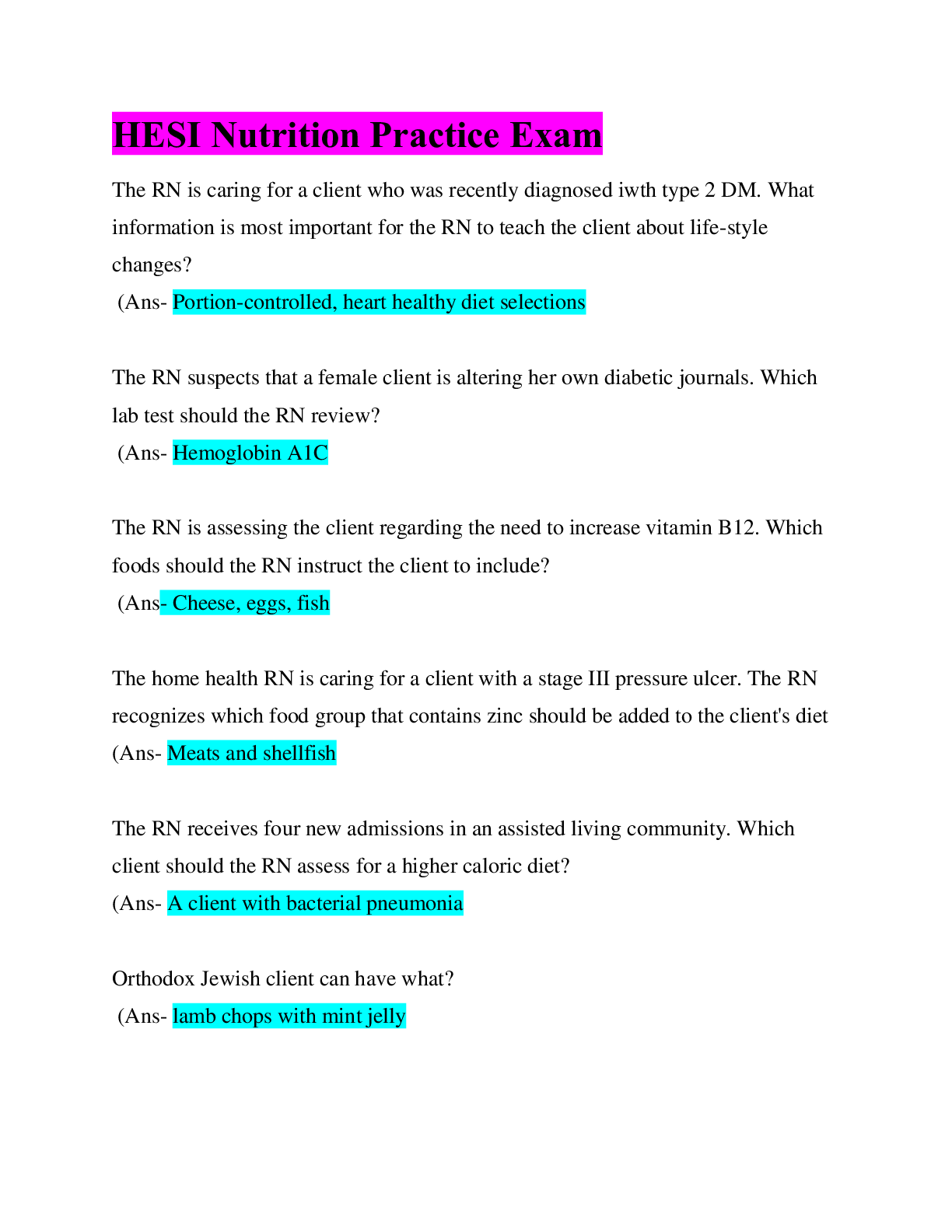
 (1).png)
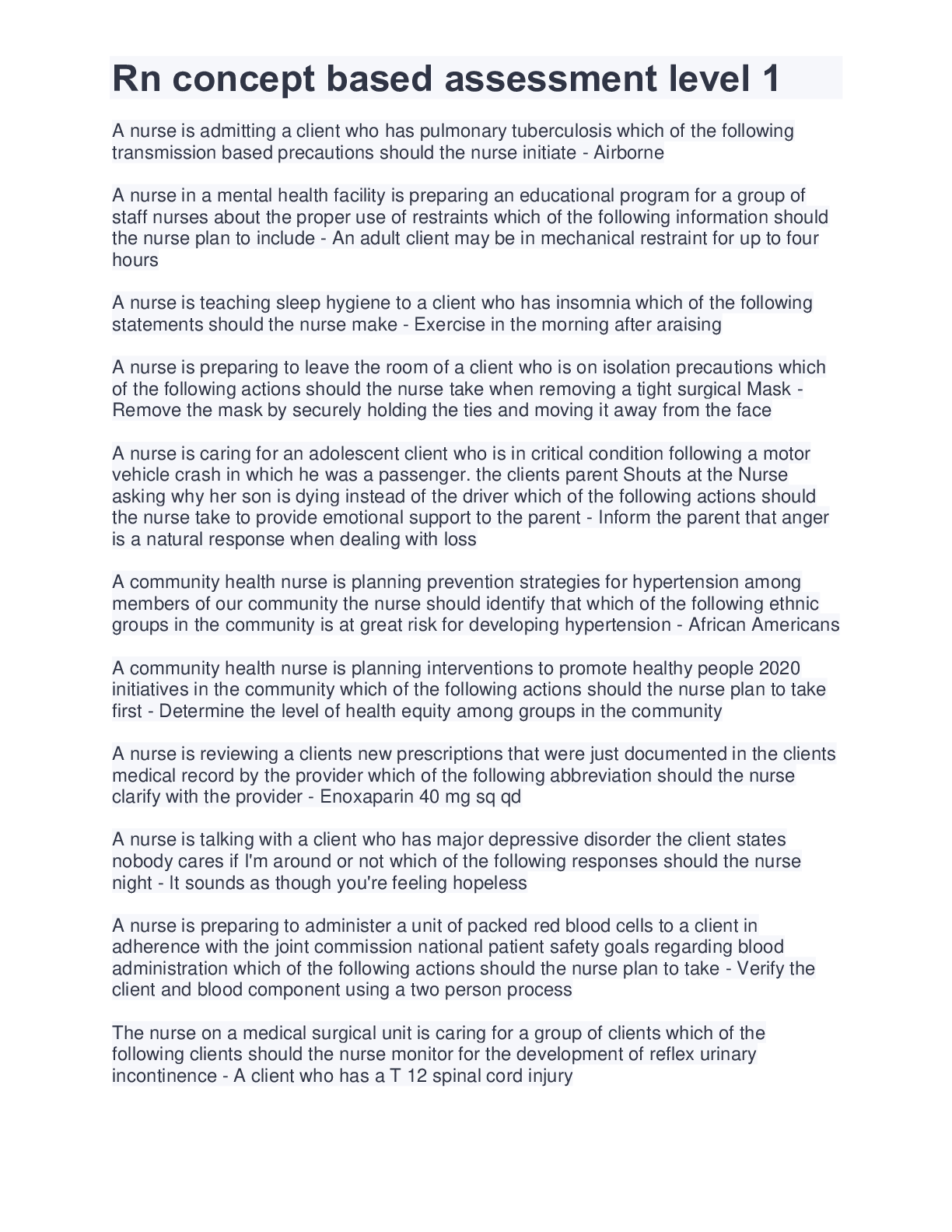
 (1).png)
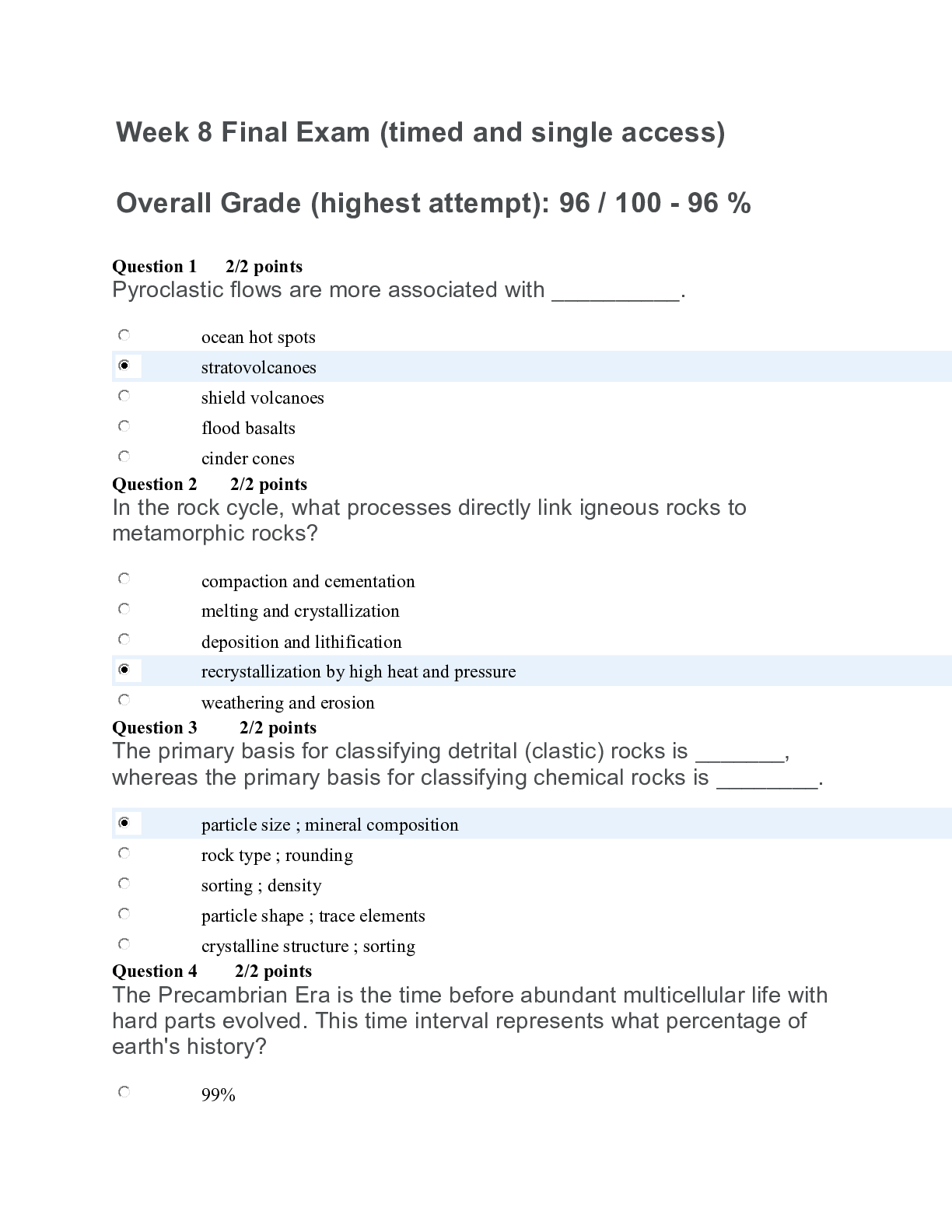
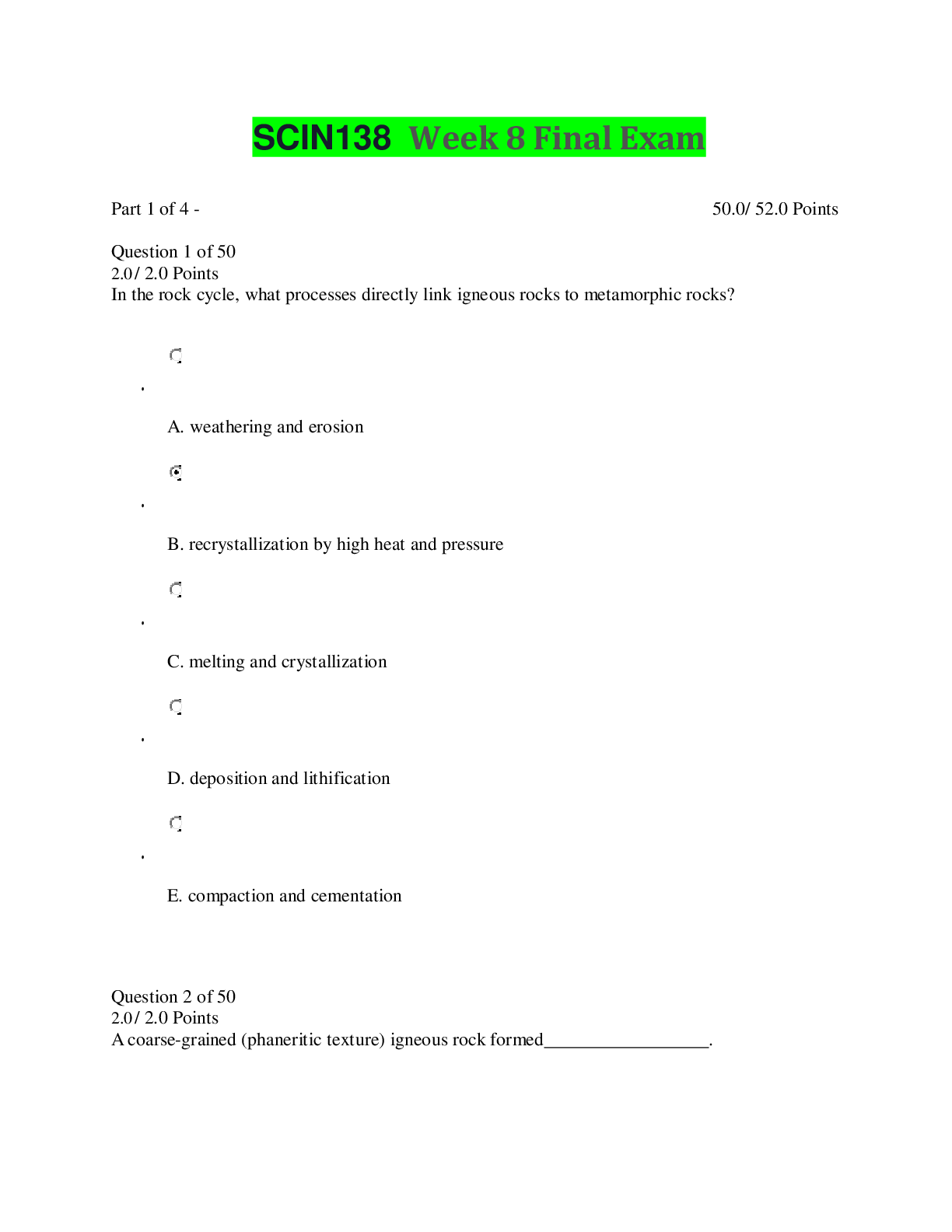
 (1).png)
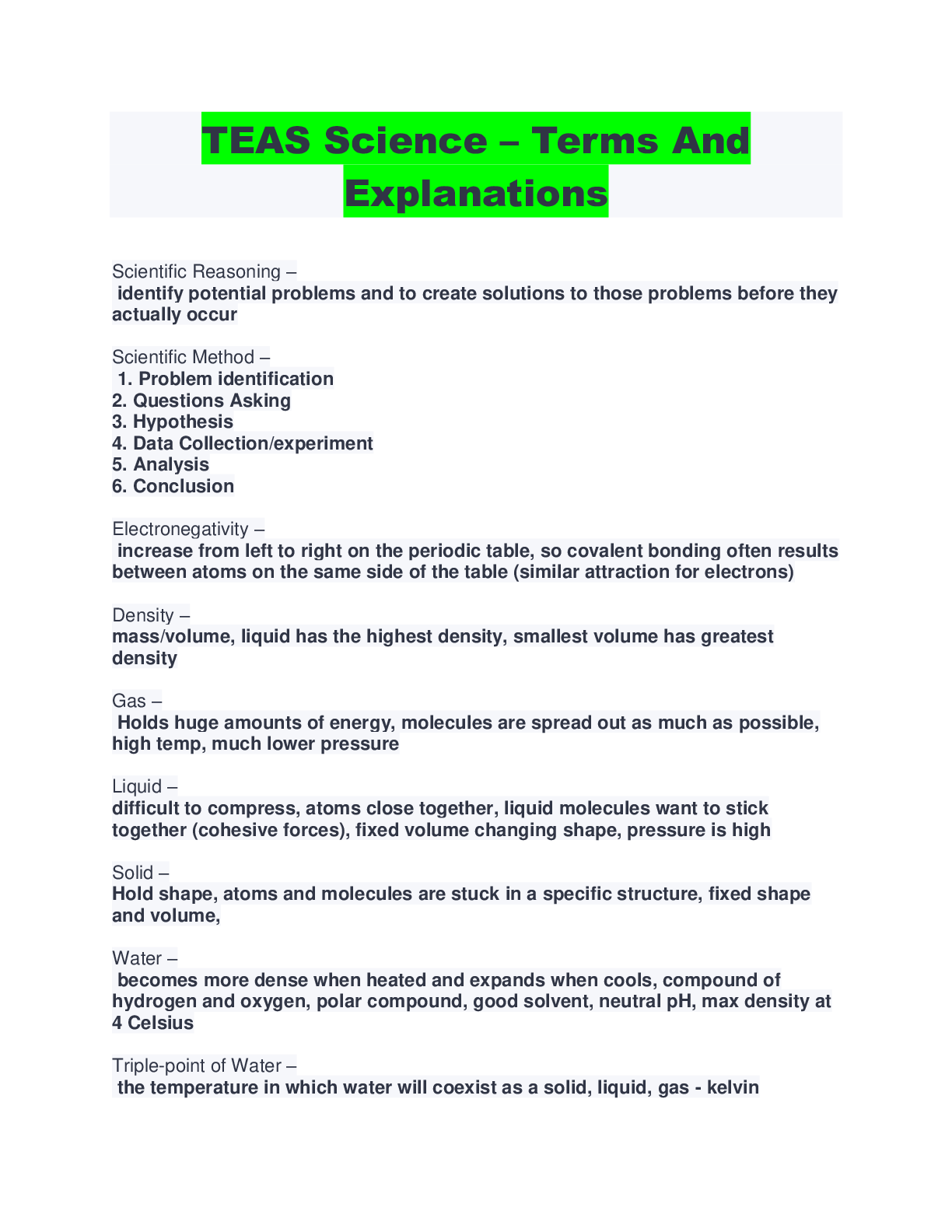

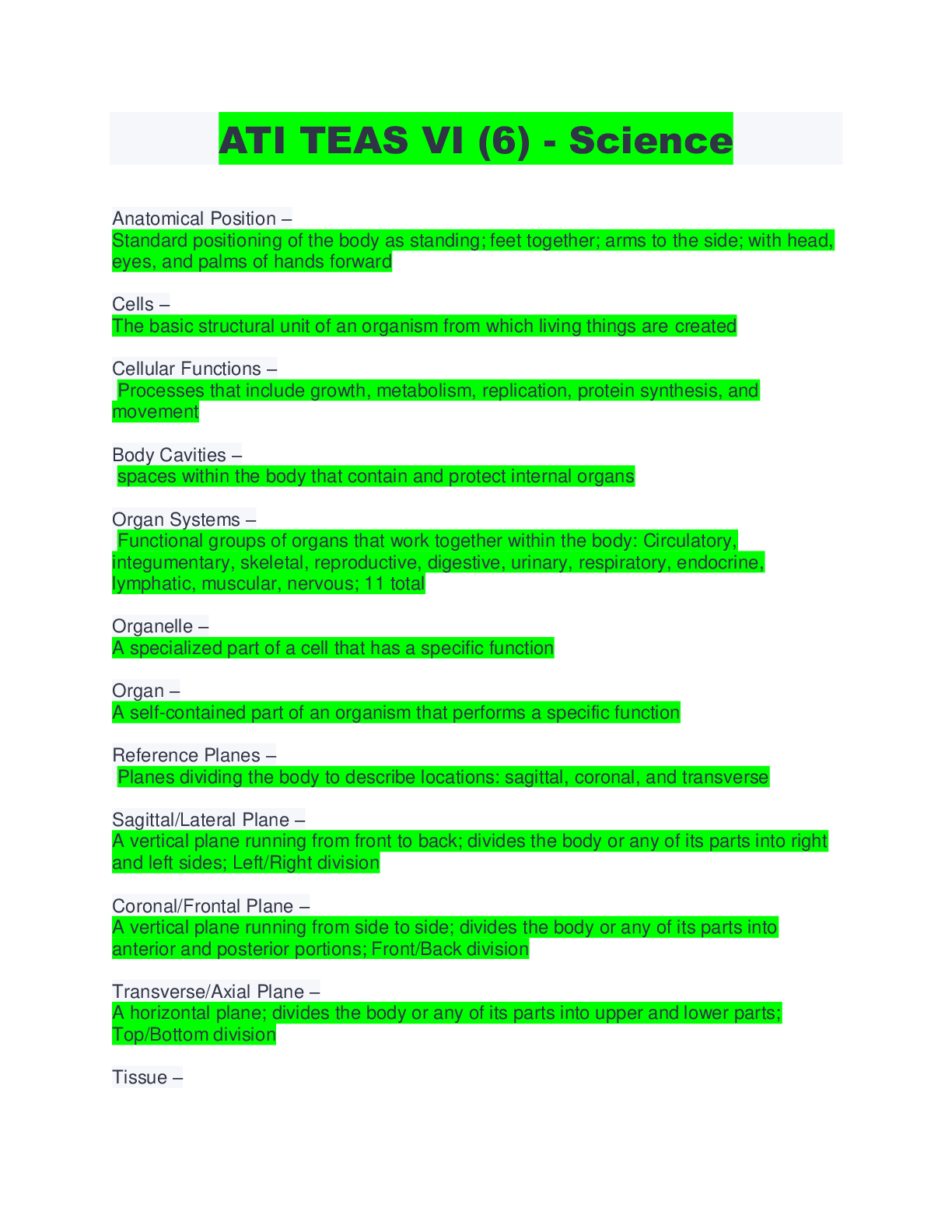
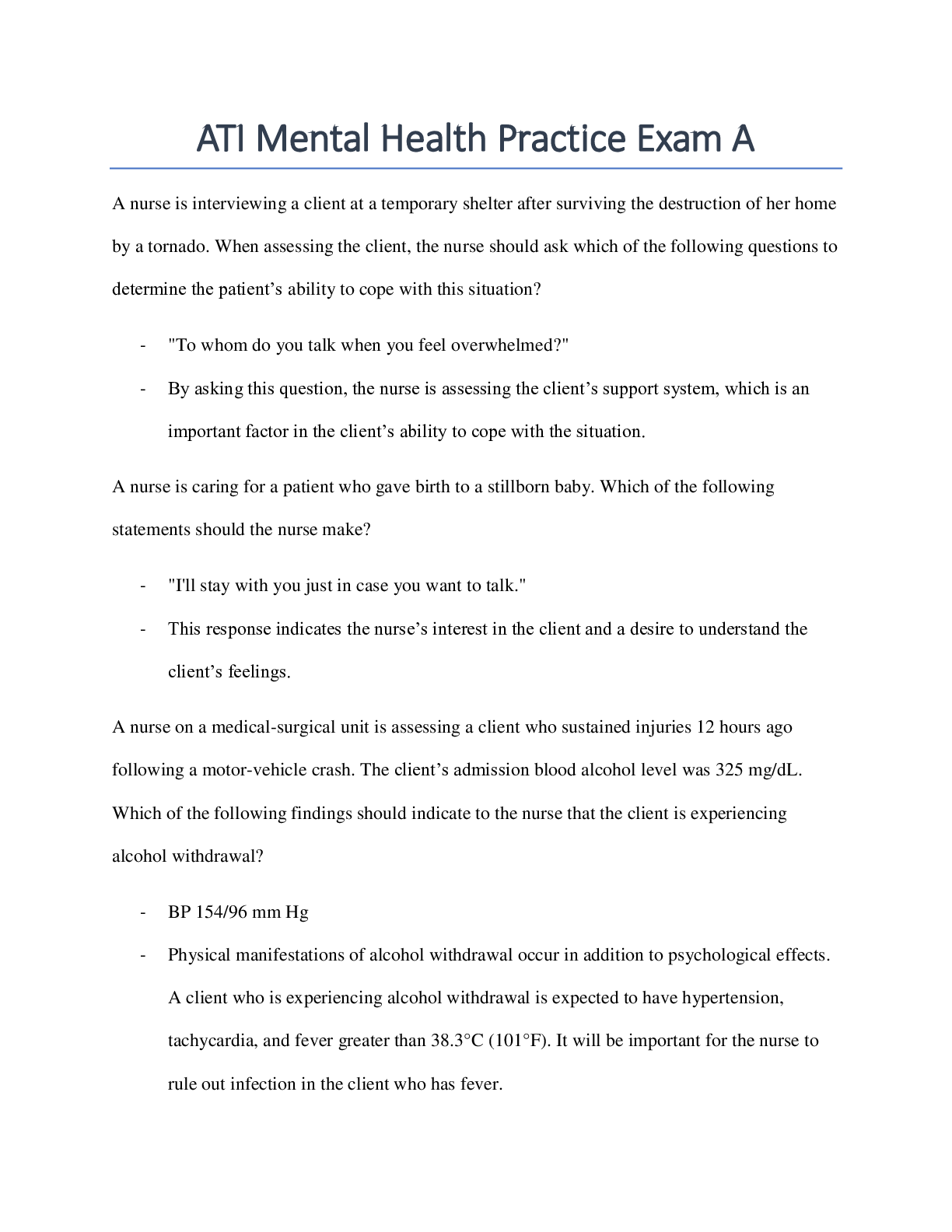
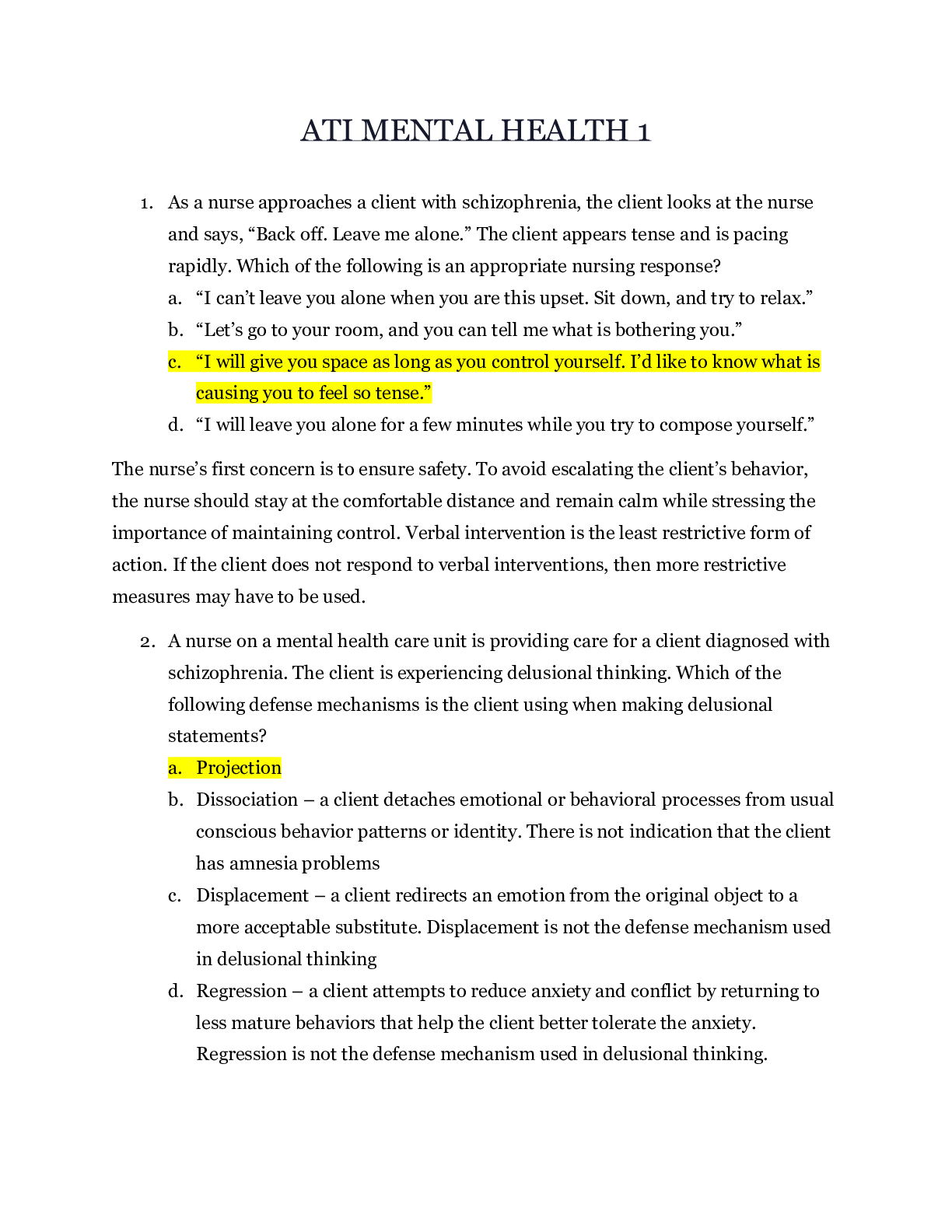

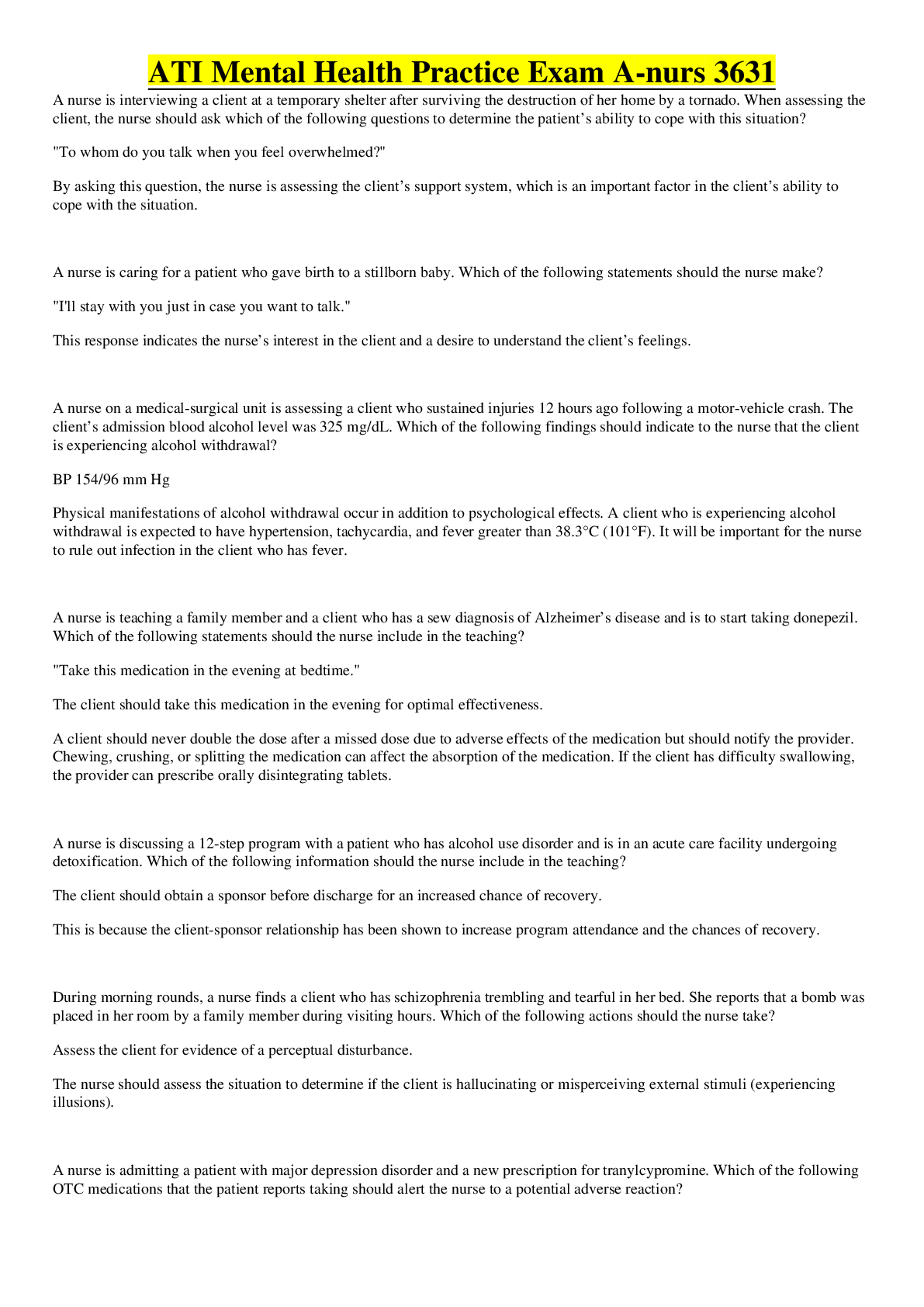
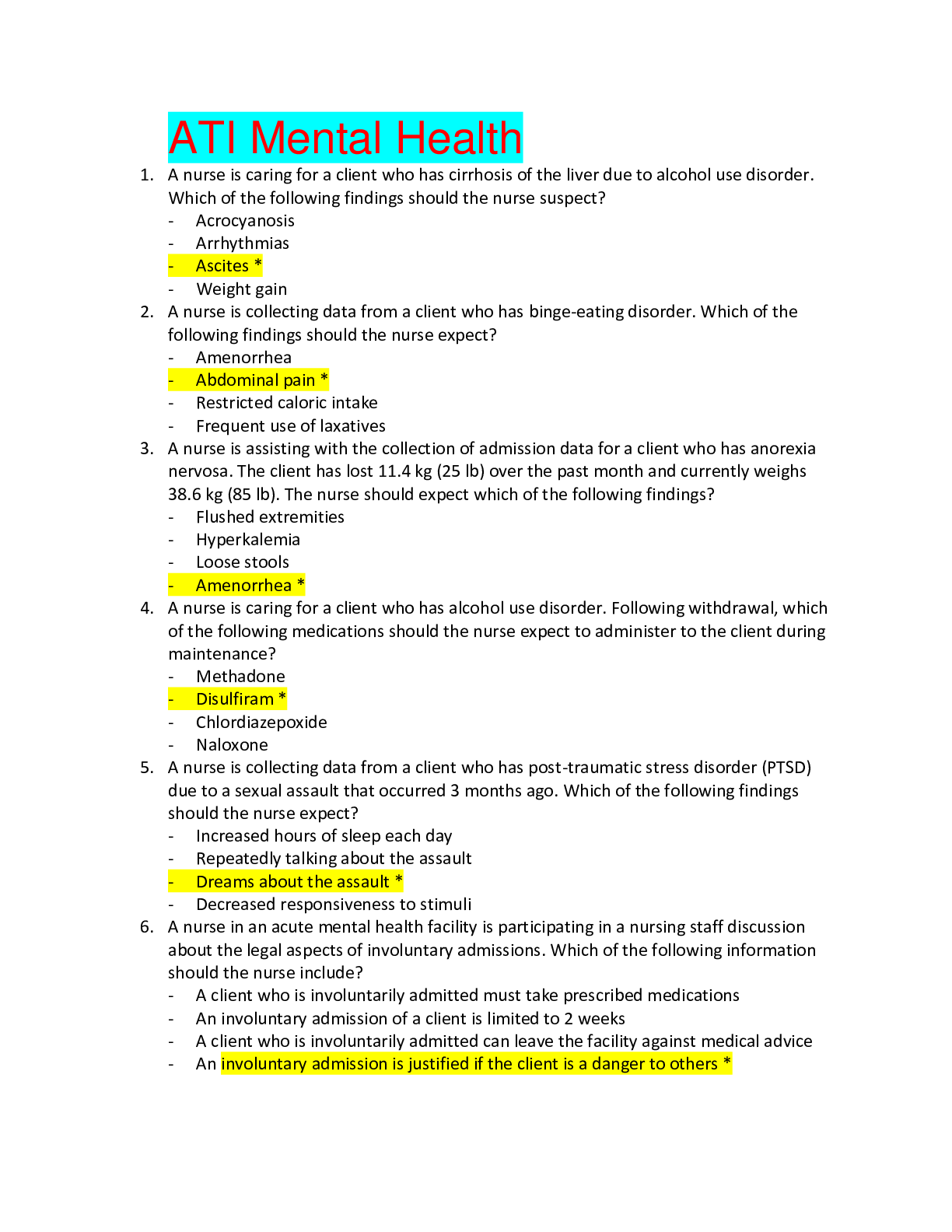
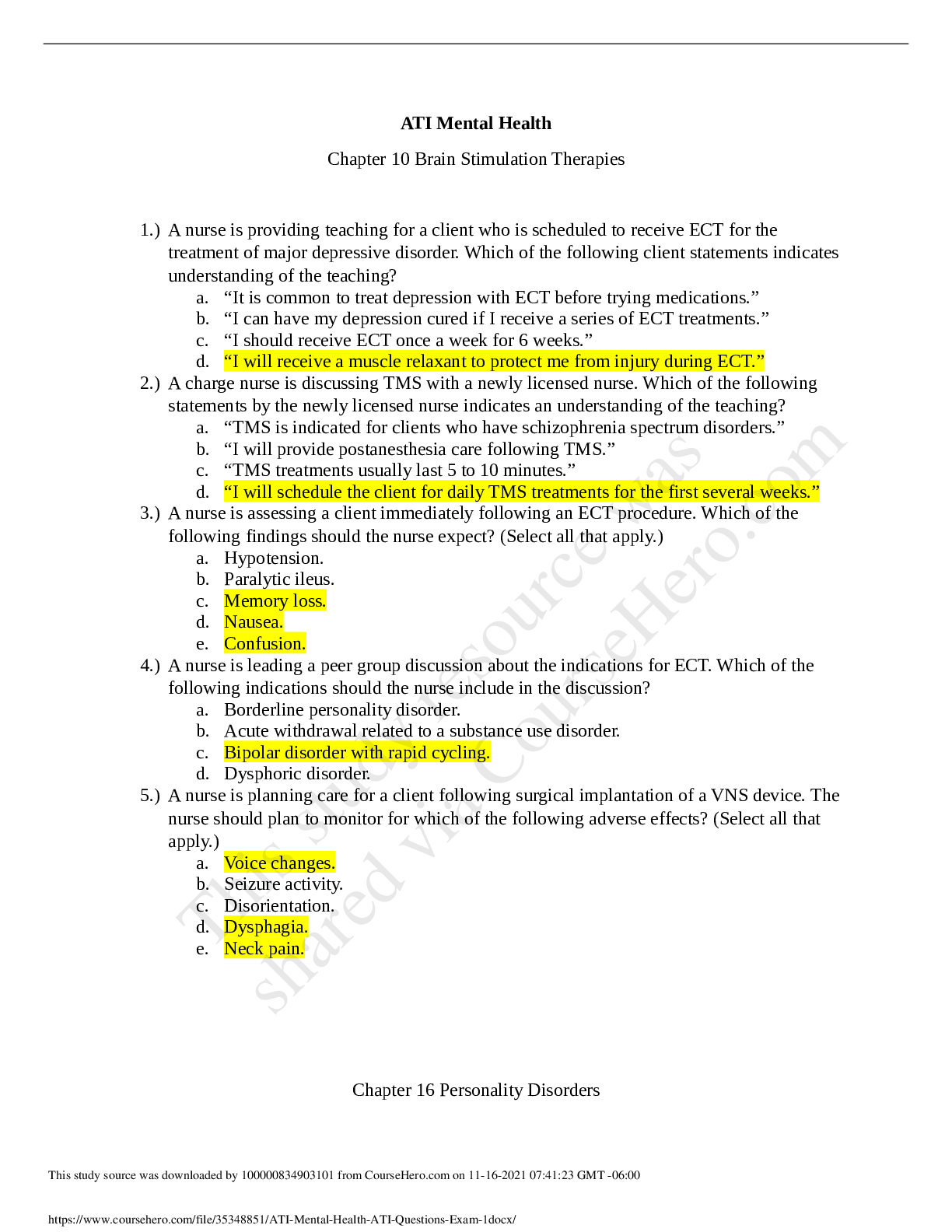
_Answers & Explanations_2020 – Chamberlain College of Nursing.png)
